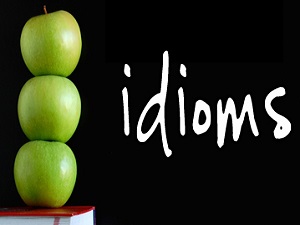
Idioms play an Important role in English and it is very important for students and others to understand them and also to be able to use them within their conversations especially in group discussions, debates etc. Even though it is not so easy as Idioms are phrases whose significance cannot be understood from the meanings of the individual words. They’ve metaphorical – meaning: – Something used or regarded as being used to represent something different. For example, the Idiom – ‘go into the wall,’ does not merely mean to walk over to the wall, but it means to become financially destroyed or bankrupt.
Idioms can be used as describing people on negative and positive qualities, for example, ‘she has a heart of gold, heart of gold that’s favorable- meaning – generous and really kind. He a cold fish- it’s a meaning- unfriendly.
We could learn people’s slow and fast attributes. He is very fast off the mark which means he gets things before everyone else, and if we say- I was a bit slow off the mark, it means I had been slow in my work.
Further, Idioms can be utilized as describing disposition or feelings. Case in point- She appears to be keeping up her chin which means joyful despite things being bad. He had a face as long as a fiddle, means depressed or sad, and it is a negative feeling. Know the devil’s advocate meaning.
Horoscopes in English language newspapers and magazines are often a fantastic place to find idioms about moods and states, as horoscope usually attempts to let you know the way you are likely to feel during the coming day, week or month etc.
We can find Idioms connected with criticism and praise connected. For example, the meal was just out of the world. The idiom is Mary wants to have her cake and eat it; typically implies that she wants everything without any contribution from her side.
Idioms are also based on titles of those parts of the body for example- He’s got a finger in each pie. It means he is involved in quite a few distinct things. I have that song on the brain – means that you can’t stop yourself from singing it. Check out http://www.encyclopedia.com/literature-and-arts/language-linguistics-and-literary-terms/language-and-linguistics/idiom to learn more about idioms.
Idioms are also connected with daily routine, such as – rise and shine, get a bite to eat, have a rest, put your feet up (unwind) and watch the box (see TV). Pupils who want to speak or write effectively and obviously need to master the idioms. Check out the devil’s advocate idiom meaning.
When learning idioms a simple dictionary will likely be of no use because it will describe the literal meaning of every word that’s useless when In regards to idioms. A good dictionary will have the source of the idiom which may help to explain how it came to take on its idiomatic meaning. For instance that the idiom ‘apple of my eye’ originally meant the central aperture of the eye And it came to mean ‘loved, cherished above others’.
